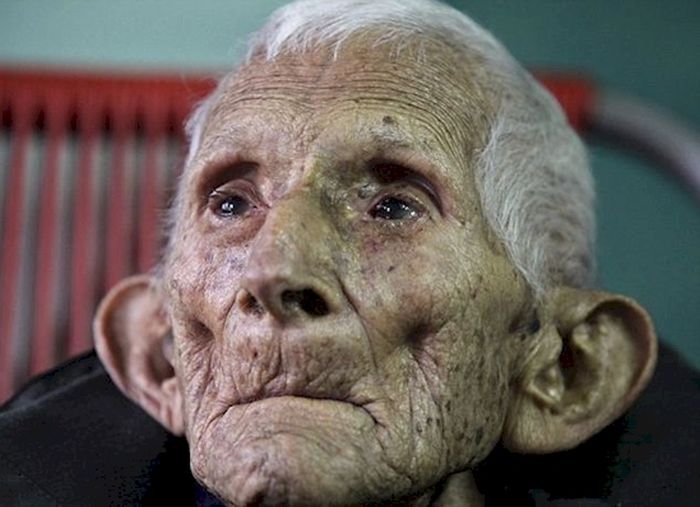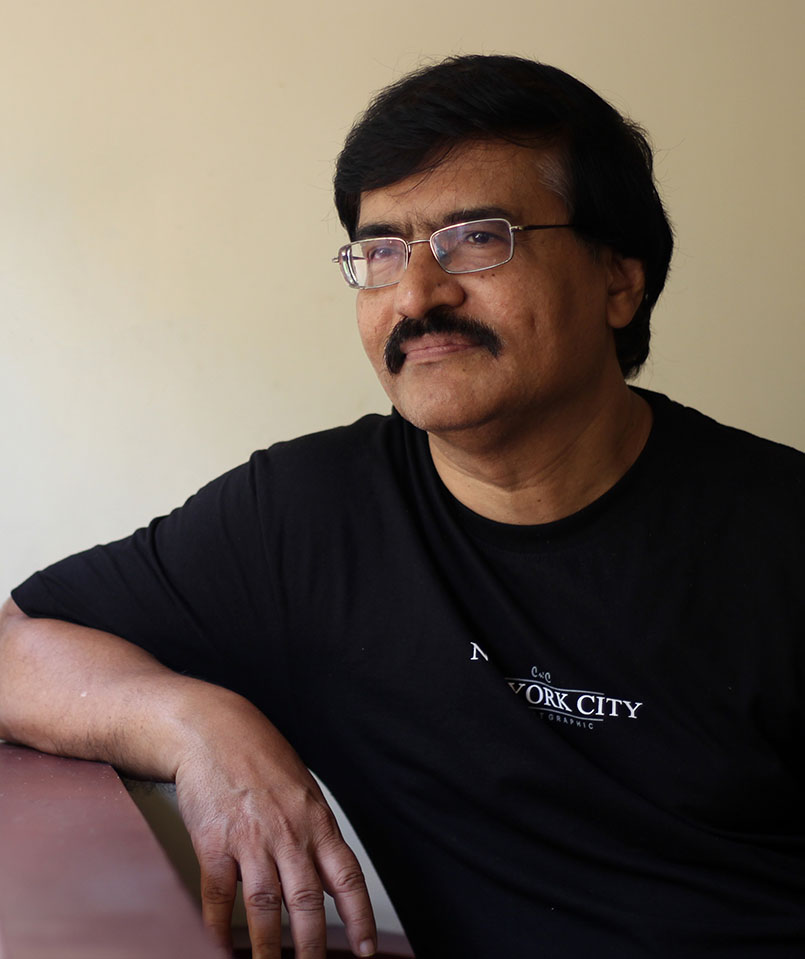As you are reading this, millions of cells in your body are shrinking and pulling away from its neighbours. The surface of each of these cells would simmer. Fragments would start breaking away and escaping like bubbles from a pot of boiling water. Soon the cell would go out of existence. Then a clean-up crew would appear to mop up the scraps. This is just one of the numerous defence, repair and maintenance processes continuously running within our bodies without us being aware of it. But that is not all. Our bodies are also designed with redundancies. For instance we are equipped with an extra kidney, an extra lung, an extra gonad (sex gland) and several extra teeth to mention a few. This arrangement ensures that we do not easily go out of existence because of internal breakdowns or external attacks. Yet the system would wear out. We would all die. And most of us would die old.There are grave challenges for people whose fate is die old. The most critical of these is who takes care of the aged. This post seeks to examine this challenge.
 A Malayalam movie I had watched many years ago tells the story of an aged mother. She lived alone in a large house in the midst of vast grounds of greenery. Her husband was long dead. All her children were comfortably settled away from home only to come home with their families once a year to spend a few days with their mother. In days of these visits, the house would go live with noise and laughter. But they would soon leave and the silence of solitude would re-enter the house and the heart of the mother. Yet, she led an active life gracefully accepting the inevitability of her situation.
A Malayalam movie I had watched many years ago tells the story of an aged mother. She lived alone in a large house in the midst of vast grounds of greenery. Her husband was long dead. All her children were comfortably settled away from home only to come home with their families once a year to spend a few days with their mother. In days of these visits, the house would go live with noise and laughter. But they would soon leave and the silence of solitude would re-enter the house and the heart of the mother. Yet, she led an active life gracefully accepting the inevitability of her situation.
She had just one desire left in her life. It was for a final resting place for her in the family property, by the side of the grave of her husband. But the children had no plans of retaining the property that would go to them after their mother’s death. And they hoped that she would die early to facilitate its sale. When their mother did not seem to be dying, the children hit upon the idea of moving her into an old age home. They explained to her the merits of such a move. She would be free from all worries of living alone and looking after the property. She would be safer, more comfortable and under better care in the new place. All she had to do was just sit back, relax and enjoy the remaining days of her life.
But the mother’s attachment to her home went beyond the issues of care and safety. Poignant memories of her life as a lovely young wife, a devoted mother and a loving grandmother remained linked to her home. She never felt lonely living close to the grave of her husband. She was cultivating the land and had cattle that she loved and looked after like her own children. Leaving all that meant giving up the life she had known all her adult life. Yet, she had no heart to stand in the way of the happiness of her children. With a heavy heart, she said goodbye to her precious home and its cherished memories.
Early the next morning, the phone in the house rang. The call had come from the institution where the mother was admitted the previous day. They had c found her lying dead on her bed…
The tragic ending of the movie was touching. But it was difficult for me then to conceive that people should go heart broken and die simply because they were relocated to a comparatively safer and more comfortable place. So I chose to believe that the sudden death of the mother was an exaggeration introduced to enhance its dramatic impact of the movie. Yet, I could never forget the piteous look on the face of the heartbroken mother as she was finally leaving behind everything intimate and familiar in her in her life.
I have since seen more of life. I have also come across real life instances of the sad plight of people who had to be ‘jailed’ for their crime of living too long. And I now understand it as a painful reality that people could be fatally struck down by the shock and dismay of the sudden loss of everything dear to them.
In the times of traditional societies, old age infirmities were accepted as shared multi-generational responsibility. The aged continued to live in their homes and died after a short period of illness. But today, everyone is in a tearing hurry, scrambling to make a living or make a better living. People simply cannot afford the time and trouble to look after their aged and incapacitated. This is a reality we just cannot get rid of by preaching idealism. And, such a situation produced the institutions for the care of the aged by whatever name these have come to be called.
Just as old age homes are products of the modern scientific age, old age itself is essentially a phenomenon of such times. Most researchers in the area believe that from the days human species roamed the Earth, their maximum life expectancies remained at 115-120 years. But unlike the present times, most died young because of the constant risk of death under which people lived, which included wars, wild animals, epidemics, expeditions, conquests and natural calamities. So there was little chance for people to live long enough to die old. “To die of age is a rare, singular and extra ordinary death…it is the last and extremist kind of dying”, wrote the famous French author Montaigne (1533-1592) about the life of his time. Researches indicate that the inhabitants of the Roman Empire had an average life span of just 27 years. It is considered that for more than 99.9 percent of the period of human existence on Earth, average life expectancies stayed at a range of 30 to 40 years.
The most dramatic leap in life expectancy occurred in the past century thanks to improved nutrition, sanitation and the breakthroughs achieved in the sphere of medical science. For example, in 1900, the average lifespan in the United States was 47 years. A century later, it spiked to 77 years. The average life expectancy in some of the developed countries has already breached the 80-year mark. In short, ageing is essentially the consequence of the spectacular progress achieved by modern man, particularly in the sphere of health care.
Atul Gawande, author and a Professor at Harvard Medical School and Harvard School of Medical Health says in his book ‘Being Mortal’, “Throughout most of human history, a society’s population formed a sort of pyramid; young children represented the largest portion – the base- and each successively older cohort represented a smaller and smaller group. In 1950, children under the age of five were 11 percent of the US population, adults aged forty-five to forty-nine were 6 percent, and those over 80 were 1 percent. Today we have as many fifty-year-olds as five-year-olds. In thirty years, there will be as many people over eighty as there are under five.” (The book came out in the year 2014).
This shift in the demographic profile is not a phenomenon confined to US or other developed countries alone. It is happening in India too. The draft report of the ‘Kerala Ageing Survey 2014’ authored by S Irudaya Rajan and U S Misra of the Centre for Development Studies says that with life expectancy going up and birth rate coming down, sometime between 2021 and 2031, Kerala would have as many people above the age of sixty as children below the age of fourteen. The implication is that there would soon be too many aged and infirm people needing care with not enough people in the younger generations to look after them. Obviously, ‘assisted living’, a euphemism for old age homes, would become more the norm than the exception.
Ageing is often described as a series of losses. Such losses include losses of income, friends, loved ones, mobility, vision, hearing, physical strength and productive pursuits to mention just a few. Its inevitability notwithstanding, moving into an institution providing paid care for the rest of their lives would be among the worst of such losses for the aged. It meant surrendering all controls into the hands of rank outsiders. Often people prefer death to such a disaster. The real life story of Harry Truman is an example.
In March 1980, Mount Saint Helens near Olympia, Washington began to rumble and steam. As a volcanic eruption was inevitable, the authorities asked the people living ten miles around the mountain to evacuate to safer places. Everyone moved out except eighty-year-old Harry Truman, a World War-I pilot and a widower. Truman lived beneath the heaving mountain in his fifty-four acres of property with sixteen cats for company. He refused to budge to the pressure of the authorities saying, “If this place is gonna go, I want to go with it”. He was so deeply (and may be foolishly) attached to the place. So, he believed that if he cleared out of his home, he would be dead in less than a week’s time, volcano or no volcano. It was catastrophe either way. On May 18, 1980, the volcano erupted. Mr Truman, his home and his cats were all buried deep under the massive flow of sizzling lava…
We see that Truman had just two options before him – perish under the simmring lava or surrender all control over his life in to the hands of rank outsiders. This is often the predicament of the aged. Relocation into an institution means all decision concerned with their lives are taken by others. It includes the when, what, how and how long of even basic routines like going to bed, getting up, eating, drinking, bathing, exercising… It is the surrender of autonomy. It is a situation as good or bad as being imprisoned. It could trigger serious psychological disturbances often leading to resistance, rebellion and even death. Seized by an overwhelming feeling of loneliness and abandonment such people might suddenly lose the desire or motivation to continue living. Researchers have been trying to find an explanation for such calamitous changes triggered by relocation. Prominent among such researchers was Stanford psychologist Laura Carstensen.
Carstensen formulated the hypothesis that “how we seek to spend our time may depend on how much time we perceive ourselves to have.” When a person is young and healthy, he or she assumes that life would go on forever. They would seek to expand their connections and aspirational horizons. Their focus would stay outside the close circle of their parents and siblings. They would invest years to scale new heights. They would be motivated by the need for ‘Self Actualization’ – the apex of Abraham Maslow’s need hierarchy pyramid of motivation.
But when people become aged or seriously sick and realize that you do not have much time left to live, the horizons of their aspirations contract. Focus then shifts to here and now. It narrows into the little pleasures of everyday living and to the company of people closest to you. As researchers put it, “It is perspective, not age, that matters most”.
Although this idea of narrowing of focus on the realization of the proximity of death is considered a discovery of modern psychology, it is touchingly dealt with by Leo Tolstoy (1828 – 1910) in his classic novella ‘The Death of Ivan Ilych”. It is not just a celebrated work of fiction but also a study of the psychological upheavals of a man on the throes of death.
The story goes like this. Ivan Ilych was a forty-five year old St. Petersburg Magistrate. He was an ambitious man. He was also a perfectionist. One day he climbed up a ladder to show the upholstery man the perfect way in which he wanted the curtains to hang. He made a false step and slipped. Being a strong and agile man he clung on and only knocked his side against the knob of the window frame. The bruised place was painful but the pain soon passed. Days went by. He thought he was fine except that he had a queer taste in his mouth and some discomfort in his left side. He considered these as just a passing worries. But soon things worsened. Ivan Ilych became seriously sick.
His wife brought in physicians and specialists. But they could not agree on the diagnosis. As Tolstoy puts it, “…the real question was to decide between a floating kidney, chronic catarrh, or appendicitis”. But Ivan Ilych was only interested in knowing whether he was going to die. But the doctors refused to entertain such inappropriate questions. So they carried out tests, prescribed medicines and promised that everything would be fine in a while. But the condition of Ivan Ilych only worsened. He was gripped by the fear of death. He hated the doctors, his wife, his family and his friends for their dishonesty towards him…
Tolstoy writes, “…in the third month of Ivan Ilych’s illness, his wife, his daughter, his son, his acquaintances, the doctors, the servants, and above all he himself, were aware that the whole interest he had for other people was whether he would soon vacate his place, and at last release the living from the discomfort caused by his presence and be himself released from his sufferings. He slept less and less. He was given opium and hypodermic injections of morphine, but this did not relieve him”.
Ivan Ilych, like most of us, had always believed that all others except him would die. Now that death breathed down his neck, he went insane with fear. He says, “Isn’t it obvious to everyone but me that I’m dying, and that it’s only a question of weeks, days… it may happen this moment. There was light and now there is darkness. I was here and now I am going there! Where?”
Tolstoy then describes how the middle-aged man’s perspectives shifted when he found that death was close at hand. He writes, “…what most tormented Ivan Ilych was that no one pitied him as he wished to be pitied. At certain moments after prolonged suffering, he wished most of all (though he would have been ashamed to confess it) for someone to pity him as a sick child is pitied. He longed to be petted and comforted. He knew he was an important functionary, that he had a beard turning grey, and that therefore what he longed for was impossible, but still he longed for it”.
Tolstoy had the deep understanding of human nature to realize that when “life’s fragility is primed” the motives and goals of people shift. So, as the reality of his approaching death sinks into Ivan Ilych, his perspectives take dramatic shifts. His horizons narrowed into simple every day pleasures of life and the comforting presence of his close family and friends. Unfortunately, his family, his friends or the eminent physicians treating him failed to see that shift.
But Gerasim, the servant of Ivan Ilych understood the agony of the sense of fear and loneliness of his master. He realized that someday he himself would be suffering these. While others avoided the sick man except for the sake formalities, Gerasim stayed with him assisting and comforting him. He sat whole nights beside the bed of his master, holding up his master’s leg on his shoulders in a position that reduced his pain and discomfort. After a few days, Ivan Ilych died…
Let me now conclude. None can ignore the reality of the times that it is often impossible for the children or other close relatives to get personally involved in the care of the aged and infirm. Some of the readers might be people presently experiencing the painful realities of such a situation. Let me confess that my own situation is no different although it is yet to reach a crisis state. Some form of ‘Assisted Living’ is inescapable in the future. I think people should start planning for it early in their lives rather than waiting to be suddenly hit by the tornado of the calamitous shifts. It is painful. But it is inevitable.
At the same time, it is imperative for individuals and institutions to understand the trauma of the aged who are uprooted from their moorings to spend the final days of their lives in strange places in the company strangers under paid care. Let those concerned remember that people who are in their sunset days have priorities other than simply prolonging their lives. “Surveys find that their top concerns include avoiding suffering, strengthening relationships with family and friends, being mentally aware, not being a burden on others and achieving a sense that their life is complete”.
Let us be aware that barring the fortunate few who die suddenly, everyone would face the terrors of old age and its frailties. Let us be aware that the aged are not seeking the care and safety provided by outsiders in a strange institution. They are seeking peace, comfort and consolation in the company of people who have long been close to their hearts. And let us remember that it is a tragedy if the end comes without a chance for people to say ‘Good Bye’ or ‘It’s okay’ or ‘I am sorry’ or ‘I love you’…












Sir, I wish your articles were not so lengthy so that intolerant/lazy people like me can easily read and understand your views.
Dear 'Unknown',
I know that my posts are rather too lengthy for the comfort of the casual reader. Then I am dealing with serious topics in which casual/lazy readers are unlikely to have any interest. Nevertheless, I am taking your suggestion seriously and would try to bring down the length of individual posts to some 2500 words from the current length of 3000 plus words for most posts. Some of the initial posts are shorter. But please continue to read even if you do not have the patience to go on until reaching the finish line. I believe that there is some useful wisdom for all in every post I write. Thanks. Kutty
yes sir. Thank you sir.
Dear sir, I am currently the accepting multigerenerational victim of a mother in law that is living too long. Not only me, but other members of this family have already wasted almost a decade of what could have been happy and productive years, just because apparently moving said MIL to a nursing home is "unthinkable". It´s a matter of unspoken and unwritten implicit social law that everyone obeys, however resentful just that the "poor old lady" can string along for years on end making all of our lives miserable and hers not one bit better. The problem with living long, are not the extra years. It is the assumption that once the kids are grown up, the family life has to go on…and on… and on… This was fine and ok when people died relatively early… but nowadays, culture must change and make family-life a part of life… not the whole life. Ok, so a couple marries, has kids, raises them and once they are out of the house… they go do *something else with their lives*! For god´s sake.. 60 years of mother´s day, is too many mother´s days . Once your kid is 21, give up on the childish expectation of a mother day or a fathers day. Go live your own life and let your kids live theirs. Be grateful if they come to visit you at all. They are your project… you were never their project. If you are lucky enough to have kids, and even better, kids that care enough for you to arrange for you to be in a nursing home, stop complaining. They shouldnpt be there. You should be on your own. Cultural expectations are the problem. The mother in the movie shouldnpt be wandering around the property… and her kids should give up their greed and her property and leave them both alone. She should just go on with her life and if the kids come visit, fine… If not, even better… whou needs greedy kids around anyway? She could rent some rooms out to people who would actually like to be there… whatever…
And get sick and die in peace. The unholiest thing of modern days is that people are constantly being taken care of, treated and overtreated so that noone can die of anything normal anymore.. all people are dying of horrible diseases or wasting away at dementia because they are not left alone to care about themselves until they fail to do so and die because they are no longer functional as a human being. This use to be the norm. Now.. being an independent adult is no longer an option for the elderly… they are taken care of like babies for so long that they are outliving the love of their relatives. Now, that´s the real tragedy.
Dear Anonymous,
“The unholiest thing of modern days is that people are constantly being taken care of, treated and over-treated so that none can die of anything normal anymore… they are taken care of like babies for so long that they are outliving the love of their relatives. Now, that is the real tragedy”.
The core issue has been articulated so wonderfully. At the same time, most realities of our lives are incapable of being defined in binaries like black or white. Often, there too many shades of grey….
Thank you for sparing your valuable time to read and comment.
Regret the delay in responding.
Regards..
Gk